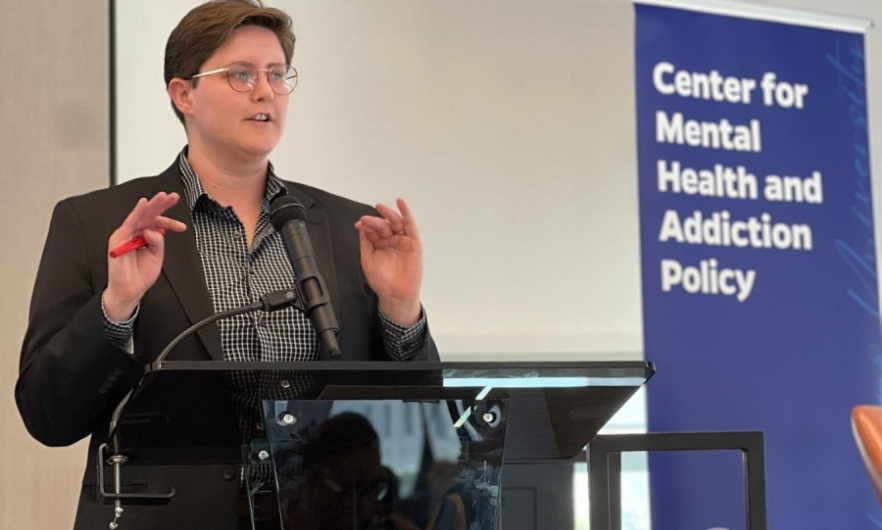Building Knowledge, Saving Lives: CMAP’s Suicide Prevention Policy Research Hub

Olivia Sugarman, PhD, MPH, speaks at CMAP's 2025 NEXUS convening on suicide prevention—an experience that helped shape the direction of her current research project under CMAP's Suicide Prevention Policy Research Hub.
The Center for Mental Health and Addiction Policy (CMAP)in the Department of Health Policy and Management received an award from the Bloomberg American Health Initiative to explore policy opportunities for suicide prevention. With this support, CMAP launched six new research projects—four already underway, including two nearing completion—focused on the intersection of policy, suicide prevention, and crisis response. The three-year award marks a milestone for the Center, strengthening its capacity for policy translation and establishing a research hub dedicated to suicide and health policy.
Year 1
The first two projects, led by Andrew Anderson, PhD, assistant professor at the Johns Hopkins Bloomberg School of Public Health, and Catherine K. Ettman, PhD, assistant professor at the Bloomberg School, began in July 2024 and will conclude in December 2025.
Anderson’s project examines how often U.S. adults experience a mental health crisis and where they turn for help. In February 2025, his team published an analysis in JAMA Network Open characterizing the availability of mobile crisis services at mental health treatment facilities in the U.S. Mobile crisis services can play a key role in suicide prevention efforts.
In September 2025, his team published a second paper supported by CMAP’s Suicide Prevention Policy Research Hub in Health Affairs Scholar that provided the first nationally representative estimates of crisis prevalence and service use. The study found that nearly 1 in 10 adults experienced a mental health crisis in the past year. Among those who sought help, only 9.9% used a mobile crisis team, while most turned to doctors, therapists, or family and friends. “A mental health crisis is not only a health event. It is an economic and housing event—conditions that can both trigger a crisis and emerge from one. It can happen to anyone,” said Anderson.
Ettman’s project explores how patient characteristics and resources shape mental health and mental health services use. Funding from CMAP’s Suicide Prevention Policy Research Hub and the Bloomberg American Health Initiative enabled Ettman to build data infrastructure for multiple projects. In her first study, she and colleagues used data from Johns Hopkins Health System electronic health records (EHR) to assess factors associated with follow-up psychiatric care following suicide related encounters. They found that prevalence for this kind of follow-up care is low.
Her second study, using national data from the Cumulative Life Stressors Impact on Mental Health and Well-Being (CLIMB) study and support from the de Beaumont Foundation, examined how financial, physical, and social resources shape suicidal ideation. Findings from Ettman’s research, which are under review, suggest that there is a relationship between these resources and suicidal ideation. “Having assets may protect people against suicidal ideation, with early findings suggesting that social support in particular is important for mental health,” said Ettman. Readers are encouraged to stay tuned for the full results when these papers are published.
Year 2
In July 2025, Sabriya Linton, PhD, MPH, associate professor and Olivia Sugarman, PhD, MPH, assistant scientist both at the Bloomberg School, launched projects that focus on suicide in two often overlooked settings: among Black youth and within jails.
Linton’s project seeks to identify the social and structural factors that contribute to suicide risk among Black youth in Baltimore. Using a participatory method called PhotoVoice, her team is equipping teens with cameras to document how their environments and experiences affect mental health and create vulnerability to suicide. Youth serve not only as participants but also as researchers, shaping the story and potential solutions. “Our goal is to inform strategies that engage youth, nonprofit leaders, and policymakers in designing interventions and creating places and spaces that reduce suicide risk and promote mental well-being for Black youth,” said Linton. This project extends Linton’s collaboration with community partner, Urban Strategies Inc.
Sugarman is leading a national research project on suicide prevention policies in local jail facilities, where suicide rates are disproportionately high and often neglected. By combining national data with interviews from jail staff and healthcare providers, her team will assess how facilities approach suicide prevention and what policies could be strengthened. “Being incarcerated is often the first time people access mental health care,” said Sugarman. “We want to spark a national conversation around suicide prevention in jails and highlight a way for public health and the carceral system to work together to strengthen community health.”
Looking Ahead
As CMAP’s Director of Research, Alene Kennedy-Hendricks, PhD, associate professor at the Bloomberg School, views the Bloomberg American Health Initiative award as a catalyst for progress. “This grant has allowed CMAP to leverage our extensive experience in health services and policy research and focus our attention on the ever-growing policy needs surrounding suicide prevention,” she said. “We hope that these projects will lead to evidence-informed policies that stem the rising rates of suicide.”
From health systems to community-based youth programs to jails, the Bloomberg American Health Initiative award is enabling CMAP to support early-career investigators, build new research infrastructure, and lay the groundwork for lasting impact. Success, from Kennedy-Hendrick’s perspective, is not just about outcomes, but about the quality and integrity of the research process, and the extent to which these findings can be disseminated to inform real-world decisions.
